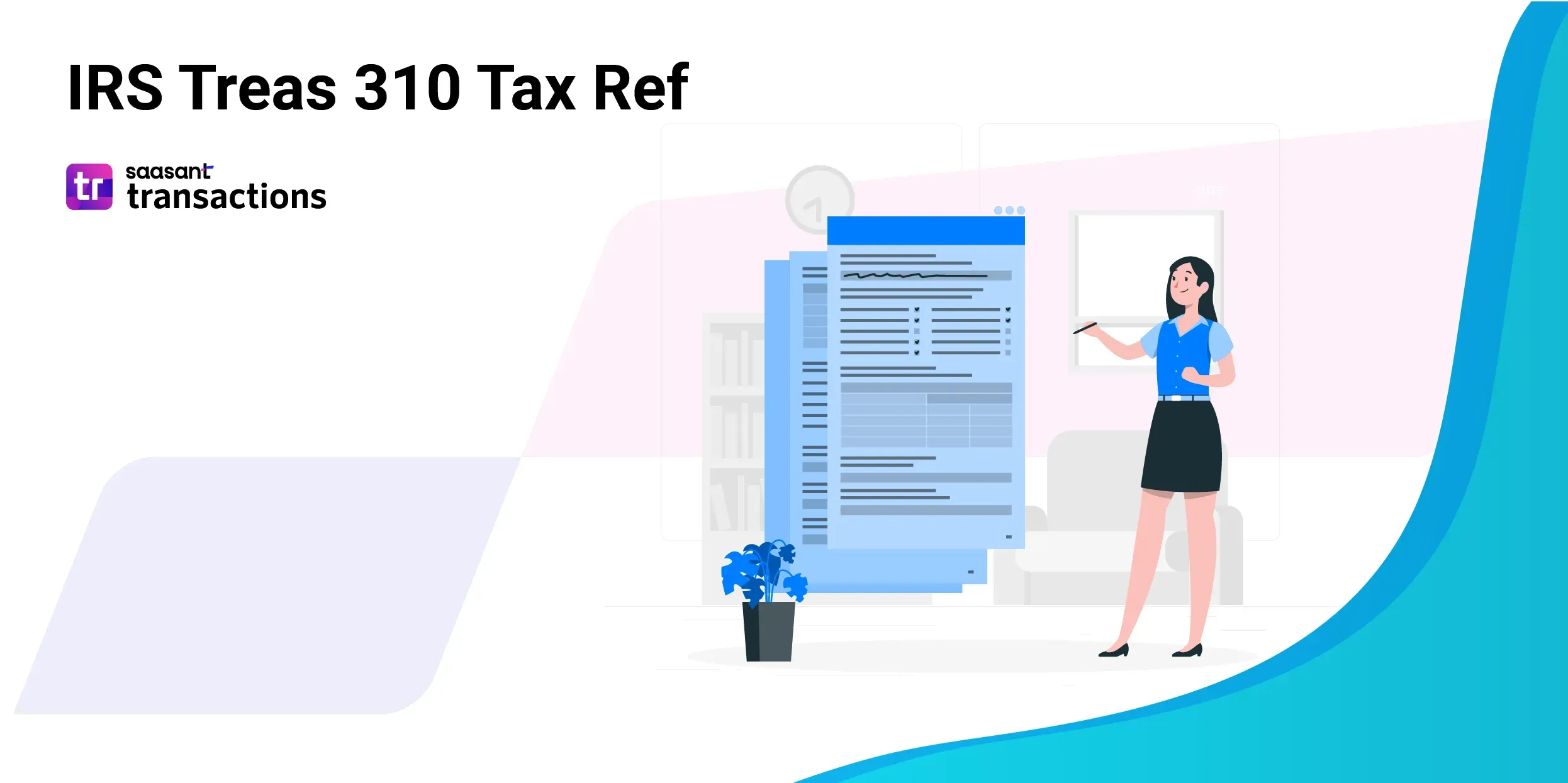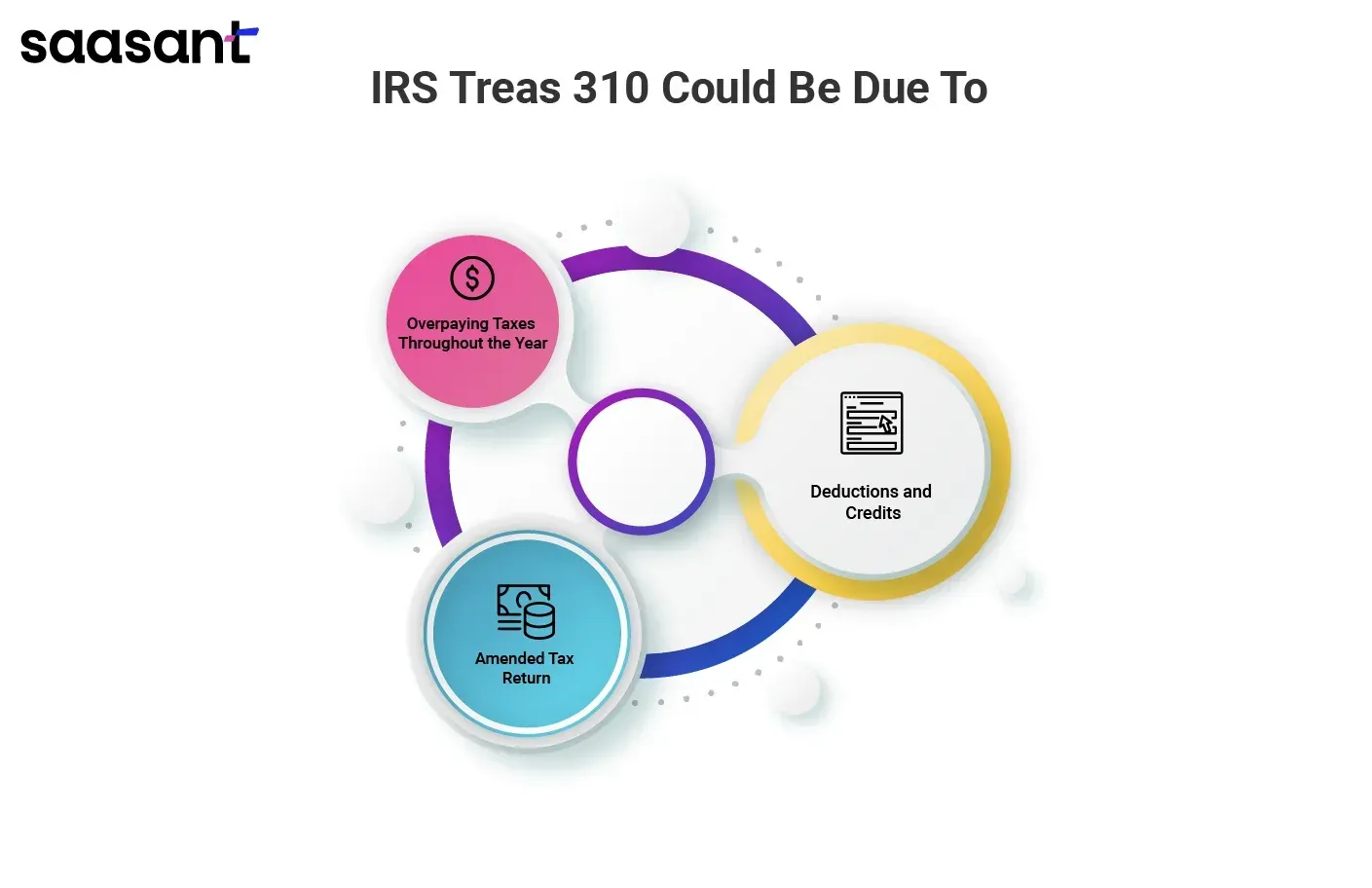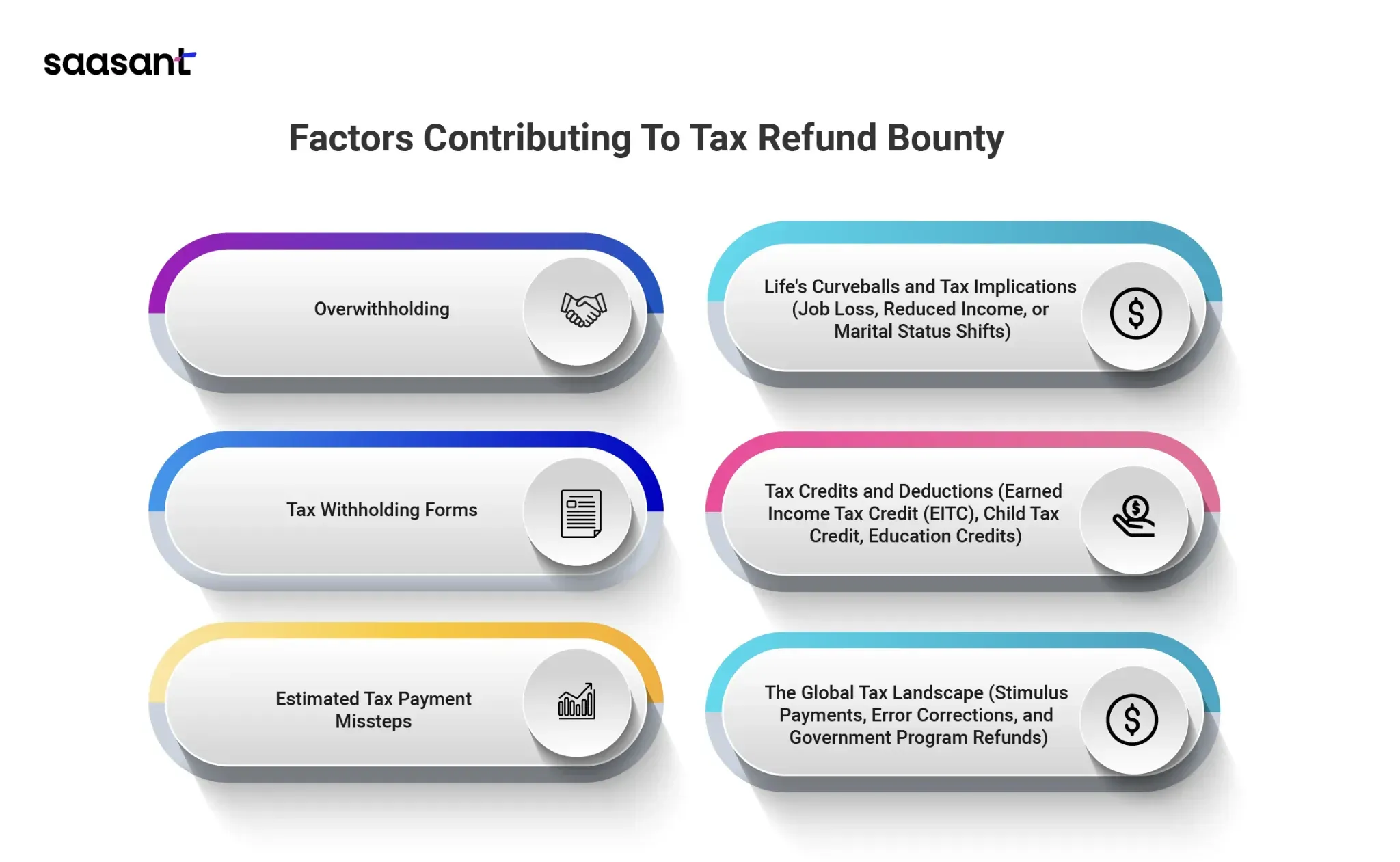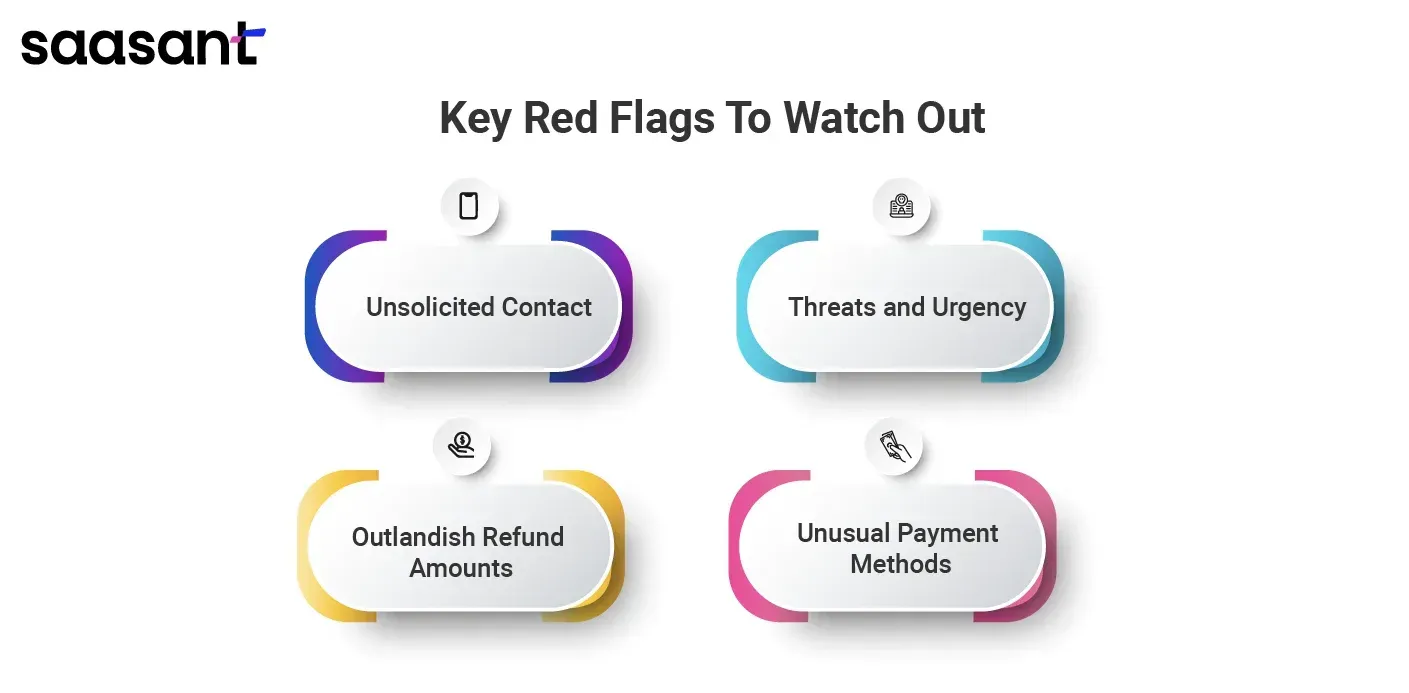IRS Treas 310 Tax Ref: What It Means and How to Handle It

Have you ever filed a tax return and received a surprising check in the mail? That, my friend, is the beautiful (or sometimes confusing) world of tax refunds. But even if you don't live in the United States, understanding tax refunds can be crucial for informed financial decisions around the globe. Let's dive in!
Contents
Tax Refunds in a Nutshell
Why Understanding Refunds Matters?
Tax Planning
Government Benefits
Global Tax Trends
Cracking the Code: What "IRS Treas 310" on Your Bank Statement Really Means
Decoding the Mystery: A Breakdown of ‘IRS Treas 310’
Unveiling the Mystery: What to Do with ‘IRS Treas 310’
Unveiling the Reasons Behind Your Windfall
Less Common Tax Refunds: Hidden Gems in Your Tax Return
A Comprehensive Guide to Managing Your IRS Treas 310 Wisely
Wrap Up
FAQs
Tax Refunds in a Nutshell
Simply put, a tax refund is money you get back from the government after you've overpaid your taxes. Throughout the year, you might pay taxes through your paycheck or estimated payments. The government calculates your total tax liability when you file your tax return. If you've spent more than you owe, you get a refund!
In the United States, the confusion often stems from a mysterious code: "IRS Treas 310" appearing on bank deposits related to tax refunds. This code simply identifies the sender as the U.S. Department of the Treasury. However, scammers sometimes use similar-sounding codes to trick people into thinking they've received a refund.
Why Understanding Refunds Matters?
Even if your country doesn't offer tax refunds similarly, grasping the concept is valuable. Here's why:
Tax Planning
Knowing how taxes work allows you to estimate your tax burden and plan your finances accordingly. You can adjust your withholdings throughout the year to avoid a large tax bill come filing time.
Government Benefits
Many countries, such as Canada, the United Kingdom, Singapore, the United States, Australia, etc., offer tax breaks or deductions for education, healthcare, or charitable contributions. Understanding these can help you maximize your return (or minimize your tax burden).
Global Tax Trends
Tax laws and policies are constantly evolving. Staying informed about global trends can help you adapt your financial strategies for the future. Tax refunds might seem like a uniquely American concept, but understanding the core principle of overpayment and potential returns is beneficial for anyone. By being financially informed, you can make smarter decisions that impact your overall well-being, regardless of location.
Cracking the Code: What "IRS Treas 310" on Your Bank Statement Really Means
Have you ever logged into your bank account, heart pounding with anticipation, only to find a mysterious deposit labeled ‘IRS Treas 310’? Don't fret, you're not alone! This seemingly cryptic code has left many people scratching their heads, wondering if it's a long-lost inheritance, a government conspiracy, or (most likely) something related to their taxes.
Fear not, international tax adventurers! This section will decipher the code and explain what ‘IRS Treas 310’ means for you, regardless of where you call home.
Decoding the Mystery: A Breakdown of ‘IRS Treas 310’
Let's dissect this code bit by bit, like a financial Indiana Jones:
IRS: This stands for the Internal Revenue Service, the tax collection agency in the United States.
Treas: Short for Treasury, referring to the U.S. Department of the Treasury, which oversees the IRS.
310: This is likely an internal code the IRS uses for processing specific transactions.
While the meaning of ‘310’ remains a secret within the IRS vault, the bigger picture is clear: ‘IRS Treas 310’ signifies a direct deposit from the IRS.
The Usual Suspect: Your Tax Refund
Usually, ‘IRS Treas 310’ signifies a tax refund from your recently filed U.S. tax return.
This could be due to:

Overpaying Taxes Throughout the Year: If you withheld more tax from your paycheck (or other income sources) than you owed, you're entitled to a refund.
Deductions and Credits: Claiming deductions for expenses or credits for life situations can reduce your tax liability, resulting in a refund.
Amended Tax Return: Did you forget to include some income or make a mistake? Filing an amended return can correct the issue and trigger a refund.
Beyond Refunds: Alternative Meanings of ‘IRS Treas 310’
While a tax refund is the most probable culprit, there are a couple of other possibilities:
Child Tax Credit: The enhanced Child Tax Credit program in 2021 might be labeled ‘IRS Treas 310 CHILDCTC’ on your statement.
Stimulus Checks: Past Economic Impact Payments (stimulus checks) might have been coded ‘IRS Treas 310’ with additional identifiers like ‘TAXEIP1,’ ‘TAXEIP2,’ or ‘TAXEIP3.’
Global Tax Refunds: Does "IRS Treas 310" Apply Internationally?
The good news for international tax filers is that ‘IRS Treas 310’ can appear on your statement regardless of your location if you filed a U.S. tax return and are due a refund via direct deposit.
However, it's crucial to remember that tax laws and filing requirements differ significantly by country. So, you have questions specific to your international tax situation. In that case, it's highly recommended that you consult a tax professional familiar with the U.S. and your home country's tax regulations.
Unveiling the Mystery: What to Do with ‘IRS Treas 310’
While the code might seem like a financial riddle, ‘IRS Treas 310’ generally indicates a positive development: a tax refund coming your way! Here's how to navigate this situation:
Check Your IRS Online Account: If you need clarification on the specific reason for the deposit, you can access your IRS online account for a clearer picture.
Contact the IRS: If the online account needs more information, you can contact the IRS directly for clarification. Their contact information is on their website.
Note: Keeping your tax documents organized is critical. This allows you to reference past filings easily and understand the reason behind any IRS deposit. Additionally, staying informed about tax deductions and credits specific to your situation can ensure you're claiming everything you're entitled to, potentially leading to bigger refunds in the future!
Unveiling the Reasons Behind Your Windfall
Several factors can contribute to your tax refund bounty:

Overwithholding: Throughout the year, your employer might withhold more tax from your paycheck than you owe. This common scenario leads to an IRS refund, returning your excess contribution.
Tax Withholding Forms: Forms like W-4 (used to claim allowances) and 1099 (for freelancers) significantly impact tax withholding. Overestimating allowances on the W-4 or having taxes withheld from freelance income (reported on 1099) can result in a refund come tax season.
Estimated Tax Payment Missteps: Self-employed individuals and those with fluctuating income make quarterly estimated tax payments. Errors in calculating income or deductions can lead to overpayment and subsequent refunds.
Life's Curveballs and Tax Implications: Major life events can influence your tax situation. Here's how:
Job Loss or Reduced Income: A significant income dip during the year can mean you overpaid taxes, triggering a refund.
Marital Status Shifts: Getting married or divorced alters your tax filing status, potentially leading to adjustments and refunds.
Tax Credits and Deductions: These powerful tools directly affect your refund amount. Let's explore some key players:
Earned Income Tax Credit (EITC): This valuable credit for low—and moderate-income earners can significantly boost your tax refund.
Child Tax Credit: This credit provides tax relief for families with children. Recent enhancements have made it even more beneficial.
Education Credits: If you're shouldering higher education costs, explore education-related tax credits that can reduce your tax burden and increase your refund.
The Global Tax Landscape: International tax laws and regulations are constantly evolving, impacting refunds in a few ways:
Stimulus Payments: During the pandemic, stimulus payments were issued to eligible individuals. These can factor into your tax refund.
Error Corrections: The IRS might identify errors in your previous returns, prompting a refund.
Government Program Refunds: Specific government programs related to housing or healthcare may trigger tax refunds.
Less Common Tax Refunds: Hidden Gems in Your Tax Return
Tax season is upon us, and while most people focus on maximizing deductions and credits, hidden gems are lurking in the tax code that could result in a surprise refund. Let's explore some lesser-known reasons you might be due a tax refund:
Government Stimulus Payback: Did You Miss Out?
The past few years have seen a surge in government stimulus programs to prop up economies during the pandemic. These programs, often called Economic Impact Payments (EIP) or Recovery Rebate Credits, were meant to be spent to stimulate the economy. However, some eligible individuals may have yet to receive them or receive the total amount. Here's the tax twist: You can claim these missed stimulus payments on your tax return for past years (typically the past 3 years). Be sure to check the IRS or your tax authority's websites for eligibility details and how to claim any missed payments on your return. This is an excellent example of how staying updated on recent tax changes can benefit you.
Tax Return Errors: The IRS Might Owe You!
Believe it or not, the IRS could be better. Sometimes, mistakes happen during processing, and you might be due a refund for an overpayment. Recent trends show increased errors related to the stimulus payments mentioned above. Additionally, with the ever-changing tax code, there's always a chance the IRS might need to correct your tax liability.
Note: Double-check your tax return before submitting it, and keep copies of all your tax documents for several years. If you suspect an error, contact the IRS or a tax professional to help you claim your rightful refund.
The Audit Aftermath: Not Always a Nightmare
Tax audits can be stressful, but they only sometimes make you owe money. Sometimes, an audit can uncover errors in your favor, leading to a refund. Here's the key: If you've been audited and believe the IRS made a mistake, contest the findings with proper documentation. While a bit daunting, a successful audit challenge can result in a sweet tax refund surprise.
Beyond Income: Social Security and Veterans' Benefits
For seniors and veterans, a hidden tax benefit might be waiting to be discovered. Some of your Social Security or Veterans' benefits might be taxable depending on your income level and filing status. The good news: If you’ve overpaid taxes on these benefits, you can claim a refund on your tax return.
New Government Programs: Stay Alert for Tax Implications
Governments worldwide are constantly launching new programs to address economic and social issues. While the specifics will vary depending on your location, some programs might have tax implications. For example, tax breaks or credits might be associated with new initiatives related to clean energy, childcare, or education. Staying informed about these changes can open doors to unexpected tax benefits.
Note: Tax laws and programs can change frequently. Consulting a tax professional or regularly checking your local tax authority's website can ensure you get all these hidden gem tax refunds.
A Comprehensive Guide to Managing Your IRS Treas 310 Wisely
Tax season is here, and with it comes the exciting (or maybe anxiety-inducing) prospect of a tax refund. But before you rush out and celebrate with a shopping spree, it's crucial to ensure your refund is legitimate and you're managing it wisely.
Tax scams are rising globally this year, and the IRS warns that criminals are getting more sophisticated. This section will equip you with the knowledge to protect yourself from fraud, ensure the accuracy of your refund, and make the most of your hard-earned money.
The Rise of Global Tax Scams and Why You Should Be Wary
Tax scams are a serious threat to taxpayers around the world. Criminals exploit the general excitement and confusion surrounding tax season to steal money and personal information. These scams can come in various forms, including:
Phishing Emails and Phone Calls: Scammers may impersonate the IRS or other tax authorities, sending emails or calling you to demand immediate payment for fabricated tax debts or promising exorbitant refunds. They pressure you to disclose personal information or send money via gift cards or wire transfers.
Refund Interception: Deceptive schemes might involve diverting your legitimate refund to the scammer's accounts by filing fraudulent tax returns in your name. This can be particularly risky if you still need to file your tax return.
Social Engineering: Scammers may use social media or cold-calling tactics to manipulate you into revealing sensitive information or sending money. They might claim to be affiliated with the IRS or offer ‘quick and easy’ solutions to complex tax problems.
Verifying the Legitimacy of Your Refund: How to Spot the Red Flags
Here are some key red flags to watch out for that can indicate a fraudulent tax scheme:

Unsolicited Contact: The IRS typically initiates contact through official letters. They will only call you if you've contacted them first. Be wary of any unsolicited phone calls, emails, or texts claiming to be from the IRS.
Threats and Urgency: Scammers often create a sense of urgency or fear by threatening arrest, penalties, or lawsuits if you don't comply with their demands. The IRS follows established procedures and sends you written notifications before taking drastic measures.
Outlandish Refund Amounts: If your refund seems too good to be true, it probably is. Refrain from falling for promises of astronomical refunds based on fabricated claims or complex schemes.
Unusual Payment Methods: The IRS will deposit your refund directly into your bank account or send you a paper check. Be wary of requests to send money via gift cards, wire transfers, or prepaid debit cards, as scammers use these standard methods.
Double-Checking Your Refund: Essential Steps for Accuracy
Before celebrating your refund, here are some proactive steps to ensure its legitimacy and accuracy:
Review Your Tax Records: Carefully compare the amount on your IRS Form 1040 (tax return) to the refund amount you received. Ensure all the income figures, deductions, and credits match your tax filing.
Check Your IRS Online Account: The IRS offers a secure online account service where you can view your tax return, tax payment history, and any correspondence they've sent you. This is a convenient way to verify the accuracy of your refund information.
Reconcile Tax Withholdings: If you receive a W-2 form from your employer, compare the federal income tax withheld amount to what's reflected on your tax return. This can help identify any discrepancies that might affect your refund amount.
Mistakes Happen: What to Do If There's an Error
Even with the best intentions, errors can occur during tax filing. If you suspect your refund is incorrect, here's what to do:
Contact the IRS: The IRS has a dedicated customer service department to assist you with your tax return and refund inquiries. Their contact information is on the official IRS website.
Gather Documentation: When contacting the IRS, have your tax return, W-2 forms, and any other relevant documents readily available. This will help them investigate the discrepancy more efficiently.
Explain the Discrepancy: Explain the nature of the error you suspect in your refund. Be polite and patient while working with the IRS representative to resolve the issue.
Handling Your Windfall Wisely: Smart Strategies for Your Refund
It's tempting to indulge in a spending spree after receiving a tax refund. However, here are some more innovative ways to manage your windfall and make it work for you in the long run:

Pay Down Debt: If you're struggling with high-interest debt like credit cards or personal loans, consider using your refund to reduce the principal amount significantly. This will save you money on interest payments in the long run and free up cash flow for other financial goals.
Boost Your Emergency Fund: Life is full of unexpected expenses. Aim to build a solid emergency fund covering 3-6 months of living expenses. This financial cushion will provide peace of mind and help you weather unexpected financial storms without resorting to debt.
Invest for the Future: Consider investing your refund in a retirement account like a 401(k) or IRA. These accounts offer tax advantages and allow your money to grow through compounding interest, helping you accumulate wealth for your future retirement needs.
Make Smart Home Improvements: Investing in energy-efficient upgrades or necessary repairs for your home can increase its value and save you money on utility bills in the long run.
Boost Your Education: If you want to upskill or pursue further education, consider using your refund to cover tuition costs or invest in online courses or certifications. This can improve your job prospects and earning potential.
Set Financial Goals: Take this opportunity to establish clear financial goals, whether saving for a down payment on a house, a dream vacation, or your child's college education. Use your refund as a springboard to kickstart your savings journey toward achieving these goals.
Seeking Professional Tax Advice: When to Consider Help?
The tax code can be complex, and navigating it alone can be daunting. Here are some instances where seeking professional tax advice might be beneficial:
Running a Business: The tax implications can be more intricate if you're self-employed or own a small business. Consulting a tax professional can ensure you're filing your taxes correctly and taking advantage of all available deductions and credits.
Complex Tax Situation: If you have a significant amount of investments, own multiple properties, or have experienced life-changing events like marriage, divorce, or inheritance, consulting a tax advisor can ensure your return is optimized and reflects your unique circumstances.
Audit Concerns: If you've received an IRS audit notification, seeking professional help is crucial. A tax advisor can represent you throughout the audit process and ensure your rights are protected.
The Rise of Online Tax Consultation Services: Convenience and Affordability
Traditionally, tax advisors were associated with high fees. Thankfully, the rise of online tax consultation services has made professional tax advice more accessible and affordable for many taxpayers. These services offer secure platforms to connect with qualified tax professionals who can answer your questions, review your tax return, and provide guidance on tax strategies.
Wrap Up
Cracking the code of that mysterious ‘ IRS Treas 310’ deposit in your bank account is empowering. No longer a source of confusion, you've unlocked the meaning and discovered it likely signifies a tax refund from the IRS. But what now? An IRS Treas 310 refund represents your hard-earned money the government has been holding onto. By filing accurately and claiming all applicable deductions and credits, you can minimize your tax burden throughout the year and potentially see a more significant IRS Treas 310 windfall come tax time.
Don't let the excitement of an IRS Treas 310 deposit lead to impulsive spending. Here are some strategic ways to make your refund work for you. Consider using it to pay down high-interest debt, a significant burden that can be tackled with a lump sum payment. This approach saves you money on interest in the long run and frees up cash flow for other goals. Building a solid emergency fund is another wise move. Aim to have 3-6 months of living expenses covered. This financial cushion provides peace of mind, knowing you can weather unexpected events without resorting to debt.
Investing in your IRS Treas 310 refund can jumpstart your future. Retirement accounts like a 401(k) or IRA offer tax advantages and allow your money to grow over time through compounding interest, putting you on the path to a secure retirement. You can also invest in your home. Energy-efficient upgrades or necessary repairs can increase your home's value and save you money on utility bills in the long run.
An IRS Treas 310 refund is an excellent opportunity to take charge of your financial future. Set clear financial goals, whether saving for a down payment on a house, a dream vacation, or your child's college education. Use your refund as a springboard to kickstart your savings journey toward achieving these goals.
The tax code can be complex, but with knowledge comes power. The IRS website is a valuable resource for US taxpayers, offering the latest updates on tax regulations, deductions, and credits specifically relevant to an IRS Treas 310 refund or any other tax situation. By staying informed, you can ensure you're filing accurately and taking advantage of all the tax benefits available.
So, the next time you see ‘IRS Treas 310’ on your bank statement, you'll know exactly what it means! You'll be armed with the knowledge to decipher the code, understand the reason behind your refund, and, most importantly, manage it wisely. Remember, financial literacy is critical to unlocking your full economic potential.
FAQs
What Does IRS Treas 310 Mean On My Bank Statement?
‘IRS Treas 310’ is a code that identifies a direct deposit from the U.S. Department of the Treasury, typically signifying a tax refund from your recently filed U.S. tax return.
Can I Get An IRS Tax Refund If I Don't Live In The United States?
Yes, if you filed a U.S. tax return and are due a refund, you can receive it via direct deposit, regardless of your location. The code ‘IRS Treas 310’ will still appear on your statement. However, tax laws and filing requirements differ by country. It is recommended that you consult a tax professional familiar with both the U.S. and your home country's regulations.
What Other Reasons Besides a Tax Refund Could Explain ‘IRS Treas 310’ On My Bank Statement?
While a tax refund is most common, there are a couple of other possibilities:
Child Tax Credit: The enhanced Child Tax Credit program in 2021 might be labeled 'IRS Treas 310 CHILDCTC' on your statement.
Stimulus Checks: Past Economic Impact Payments (stimulus checks) might have been coded 'IRS Treas 310' with additional identifiers like 'TAXEIP1,' 'TAXEIP2,' or 'TAXEIP3.'
How Can I Be Sure My ‘IRS Treas 310’ Deposit Is Legitimate And Not a Scam?
Tax scams are on the rise. Here are some red flags to watch out for:
Unsolicited contact: The IRS typically initiates contact through official letters.
Threats and urgency: Scammers create a sense of urgency by threatening arrest or penalties if you don't comply with their demands.
Outlandish refund amounts: Don't fall for promises of astronomical refunds.
Unusual payment methods: The IRS will deposit your refund directly into your bank account or send you a paper check. Be wary of requests to send money via gift cards, wire transfers, or prepaid debit cards.
What Should I Do If I Think My ‘IRS Treas 310’ Refund Amount Is Incorrect?
Even with the best intentions, errors can occur. Here's what to do:
Contact the IRS: Explain the nature of the error you suspect.
Gather Documentation: Make your tax return, W-2 forms, and other relevant documents readily available.
How To Claim a Missed Stimulus Payment On My Tax Return?
The past few years saw the introduction of Economic Impact Payments (stimulus checks) to support individuals financially during the pandemic. While most eligible people received these payments automatically, some may not receive the total amount. The good news is you can claim these missed stimulus payments by filing an amended tax return for the year(s) they were issued (typically the past 3 years). Here's a breakdown of the process:
You'll need your tax return (Form 1040) for the year you claim the missed payment.
If you still need to file a tax return for that year, you must file one now to claim the stimulus payment.
Any documentation you have related to the stimulus payment, such as IRS notices (Notices 1444 or 1444-B) you may have received.
Visit the IRS website to access the ‘Get My Payment’ tool or the ‘Your Online Account’ (if you have one).
These tools can help you determine the amount of the stimulus payment you were eligible for but did not receive.
You can file Form 1040X, Amended U.S. Individual Income Tax Return, to claim the missed stimulus payment.
The IRS website provides instructions on how to complete and file Form 1040X electronically or on paper.
Note: The deadline to claim a missed stimulus payment on your tax return generally aligns with the deadline for filing your tax return for that year (typically October 15th of the following year, with extensions available).
Should I Invest My Tax Refund?
Yes, consider investing your refund in a retirement account like a 401(k) or IRA. These accounts offer tax advantages and help you grow your money over time.
What Are Some Ways To Use My Tax Refund To Improve My Financial Situation?
Here are some innovative ways to manage your tax refund:
Pay down high-interest debt.
Build an emergency fund.
Invest for the future (retirement or education).
Make smart home improvements.
What Is The Difference Between a Tax Refund And a Stimulus Payment?
A tax refund is money you get back from the government after you've overpaid your taxes throughout the year. A stimulus payment is a direct payment from the government intended to boost the economy during times of crisis. While both might appear as ‘IRS Treas 310’ on your statement, they have different purposes.
How Can I Avoid Tax Overpayment And Get a Bigger ‘IRS Treas 310’ refund next year?
Here are some ways to minimize tax overpayment:
Adjust your tax withholding throughout the year using forms like W-4.
Claim all eligible deductions and credits on your tax return.
Consider estimated tax payments if you're self-employed or have a fluctuating income.
What Are Some Common Tax Deductions And Credits That Could Increase My ‘IRS Treas 310’ Refund?
Several deductions and credits can impact your refund amount:
Earned Income Tax Credit (EITC): Valuable credit for low- and moderate-income earners.
Child Tax Credit: Provides tax relief for families with children.
Education Credits: This can reduce your tax burden if you're shouldering higher education costs.
Where Can I Find More Information About Tax Laws and Filing Requirements?
The IRS website is a valuable resource for U.S. taxpayers. It offers the latest updates on tax regulations, deductions, and credits.
How Long Does It Take To Get An ‘IRS Treas 310’ Direct Deposit Refund?
The processing time for tax refunds can vary depending on the complexity of your return and the filing method. Electronic filing with direct deposit is generally faster, typically within a few weeks.
Can I Track The Status Of My ‘IRS Treas 310’ Refund?
Yes, the IRS offers a "Where's My Refund?" feature on their website that allows you to track the status of your refund using your Social Security number, filing status, and expected refund amount.
What Should I Do If I Haven't Received My ‘IRS Treas 310’ Refund After a Reasonable Waiting Period?
If you haven't received your ‘IRS Treas 310’ deposit after a reasonable waiting period (typically 21 days for e-filers and 6 weeks for paper filers), here are some steps you can take to investigate the delay and expedite the process:
The first step is to verify the status of your refund directly with the IRS. You can utilize the user-friendly "Where's My Refund?" feature to track your refund progress using your Social Security Number (SSN), filing status, and expected refund amount.
Even minor mistakes can trigger delays while the IRS corrects them.
Returns involving self-employment, business income, or certain deductions require additional scrutiny from the IRS.
The IRS may need to verify your identity or income information before processing your refund.
If you qualify for the EITC but have yet to claim it, your refund will be delayed until the IRS processes your return.
I'm a Freelancer or self-employed Person. How Can I Ensure I'm Filing Taxes Correctly To Maximize My ‘IRS Treas 310’ Refund Potential?
Self-employed individuals should keep meticulous records of income and expenses. Consulting a tax professional familiar with self-employment tax regulations can ensure you file accurately and claim all eligible deductions.